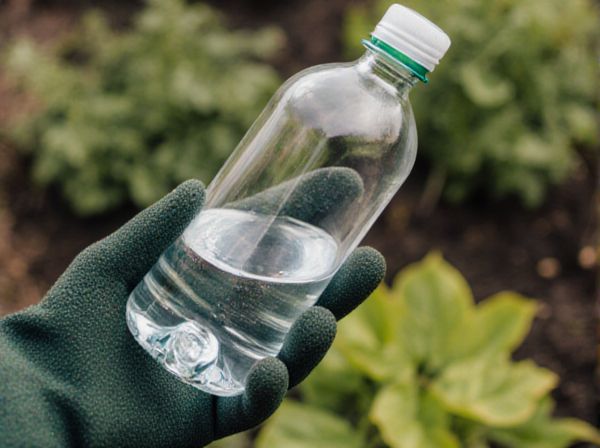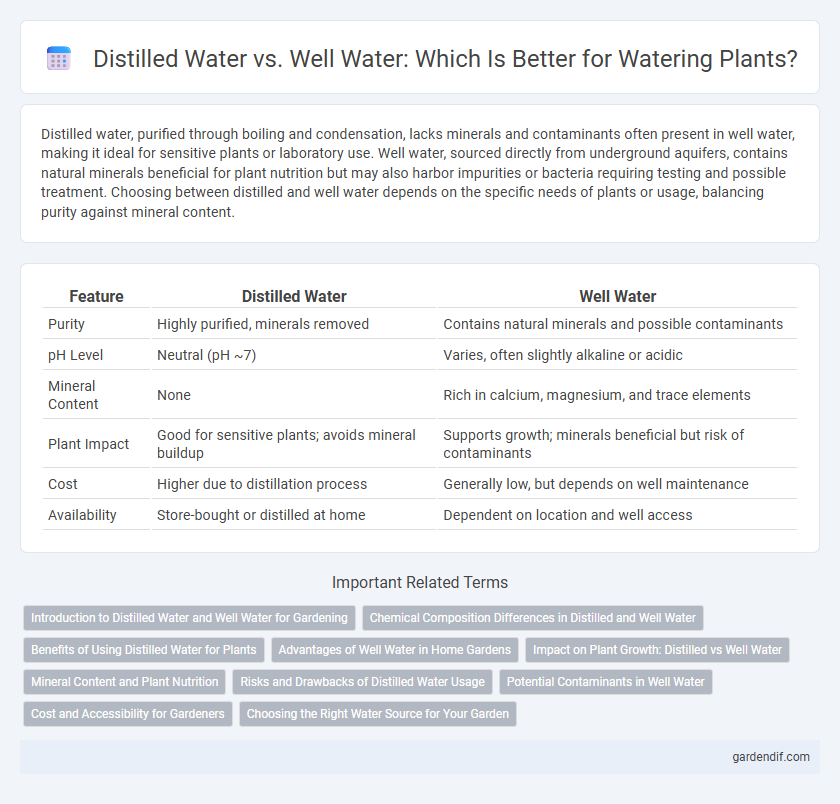
Distilled water vs Well water Illustration
Distilled water, purified through boiling and condensation, lacks minerals and contaminants often present in well water, making it ideal for sensitive plants or laboratory use. Well water, sourced directly from underground aquifers, contains natural minerals beneficial for plant nutrition but may also harbor impurities or bacteria requiring testing and possible treatment. Choosing between distilled and well water depends on the specific needs of plants or usage, balancing purity against mineral content.
Table of Comparison
| Feature | Distilled Water | Well Water |
|---|---|---|
| Purity | Highly purified, minerals removed | Contains natural minerals and possible contaminants |
| pH Level | Neutral (pH ~7) | Varies, often slightly alkaline or acidic |
| Mineral Content | None | Rich in calcium, magnesium, and trace elements |
| Plant Impact | Good for sensitive plants; avoids mineral buildup | Supports growth; minerals beneficial but risk of contaminants |
| Cost | Higher due to distillation process | Generally low, but depends on well maintenance |
| Availability | Store-bought or distilled at home | Dependent on location and well access |
Introduction to Distilled Water and Well Water for Gardening
Distilled water is purified through a boiling and condensation process, removing impurities and minerals, making it ideal for sensitive plants requiring mineral-free hydration. Well water, extracted directly from underground sources, contains natural minerals and nutrients beneficial for most garden plants but may also harbor contaminants depending on the well's location. Understanding the composition and effects of distilled versus well water aids gardeners in optimizing plant health and growth.
Chemical Composition Differences in Distilled and Well Water
Distilled water is chemically pure, containing no dissolved minerals, salts, or organic matter, resulting from the vapor condensation process that removes impurities. Well water, in contrast, contains various dissolved minerals such as calcium, magnesium, iron, and trace elements from underground sources, which influence its pH, hardness, and overall chemical composition. The presence of these minerals in well water affects plant nutrient absorption and soil health, whereas distilled water's lack of minerals makes it ideal for applications requiring mineral-free water.
Benefits of Using Distilled Water for Plants
Distilled water offers plants a pure, contaminant-free hydration source, eliminating harmful minerals and chemicals that can accumulate in soil. This promotes healthier root systems and prevents nutrient imbalances commonly caused by well water's variable mineral content. Using distilled water ensures consistent moisture quality, enhancing plant growth and reducing the risk of diseases linked to water impurities.
Advantages of Well Water in Home Gardens
Well water provides essential minerals such as calcium and magnesium that promote healthier plant growth in home gardens. It is often richer in natural nutrients compared to distilled water, supporting stronger root development and improving soil vitality. Using well water reduces the need for synthetic fertilizers, enhancing sustainable gardening practices.
Impact on Plant Growth: Distilled vs Well Water
Distilled water provides a pure and mineral-free option for watering plants, which prevents the buildup of salts but may require supplemental nutrients for optimal growth. Well water contains naturally occurring minerals and trace elements that can enhance plant development but may also introduce contaminants or imbalanced pH levels affecting plant health. The choice between distilled and well water significantly influences nutrient availability, soil chemistry, and overall plant growth outcomes.
Mineral Content and Plant Nutrition
Distilled water lacks minerals, making it ideal for plants sensitive to mineral buildup but may require supplemental nutrients for optimal growth. Well water contains essential minerals like calcium, magnesium, and potassium that naturally support plant nutrition but can vary in concentration and potentially cause salt accumulation. Understanding the mineral content of each water type helps optimize fertilization strategies and prevent deficiencies or toxicity in plants.
Risks and Drawbacks of Distilled Water Usage
Distilled water lacks essential minerals such as calcium and magnesium, which can negatively impact soil nutrient balance and plant health over time. Its high purity may cause nutrient leaching, leading to deficiencies and stunt plant growth if used exclusively for watering. Furthermore, distilled water's low pH may disrupt soil microbiota, increasing vulnerability to pests and diseases.
Potential Contaminants in Well Water
Well water often contains potential contaminants such as bacteria, nitrates, heavy metals like lead and arsenic, and pesticides due to natural underground sources and nearby agricultural activities. These contaminants can affect plant health and soil quality when used for watering. Distilled water, being purified through boiling and condensation, lacks these impurities, making it a safer option for sensitive plants.
Cost and Accessibility for Gardeners
Distilled water typically costs more due to the purification process, making it less accessible for large-scale gardening applications. Well water, sourced directly from underground aquifers, offers a cost-effective and readily available option for gardeners, especially in rural areas. While well water may require testing for mineral content and contaminants, its affordability and accessibility make it a preferred choice for most home gardeners.
Choosing the Right Water Source for Your Garden
Choosing the right water source for your garden significantly impacts plant health and soil quality. Distilled water, free from minerals and contaminants, is ideal for sensitive plants requiring pure hydration without the risk of mineral buildup. Well water contains essential minerals but may have variable pH levels and potential contaminants, making regular testing and treatment crucial for maintaining optimal garden conditions.
Distilled water vs Well water Infographic

 gardendif.com
gardendif.com